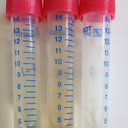Over-expression of beta-1,4-galactosyltransferase I, II, and V in human astrocytoma.
Keywords
Abstract
OBJECTIVE
beta-1,4-Galactosyltransferase (beta-1,4-GalT) I, II, and V are the enzymes responsible for the biosynthesis of N-acetyllactosamine on N-glycans by transferring UDP-galactose to the terminal N-acetylglucosamine (N-GlcNAc) residues with the formation of a beta-1,4-linkage. Neoplasms undergo various changes in the carbohydrate of their glycoconjugates, indicating the possible changes in glycosyltransferases themselves.
METHODS
Therefore, we compared the expression of beta-1,4-GalTs between astrocytoma and normal brain tissues.
RESULTS
Our reverse-transcription polymerase chain reaction (RT-PCR) results showed that beta-1,4-GalT I transcript was absent in normal adult brain but detectable in grade II, III, and IV astrocytomas; the level of beta-1,4-GalT II transcript was increased in grade II, III, and IV astrocytomas while only a trace amount was found in normal brain; beta-1,4-GalT V transcript existed in normal brain and increased in the process of astrocytoma progress, with the highest level in grade IV astrocytoma. By Ricinus communis agglutinin-1 (RCA-1) lectin blot assay, we also found the more extensive galactosylated bands in astrocytomas compared with normal brain. A major 61kD protein was galactosylated in astrocytoma but not in normal brain tissues.
CONCLUSIONS
These results indicate that the increase of galactosylation in astrocytomas may be caused by the alterations of gene expression of beta-1,4-GalT I, II, and V and that the malignant degree of astrocytoma is correlated with the expression of beta-1,4-GalT V.




